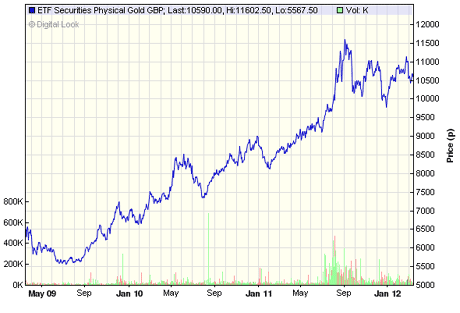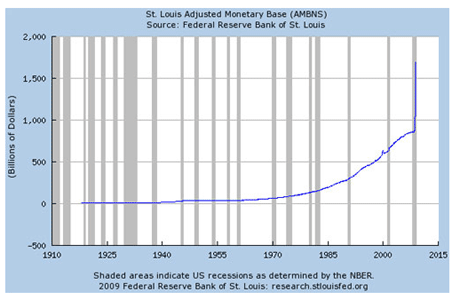Gold bubble? No chance
With the recent pullback in the price of gold, many people are calling this the end of the bubble. That’s rubbish, says Bengt Saelensminde. Here's why.
Get the latest financial news, insights and expert analysis from our award-winning MoneyWeek team, to help you understand what really matters when it comes to your finances.
You are now subscribed
Your newsletter sign-up was successful
Want to add more newsletters?

Twice daily
MoneyWeek
Get the latest financial news, insights and expert analysis from our award-winning MoneyWeek team, to help you understand what really matters when it comes to your finances.

Four times a week
Look After My Bills
Sign up to our free money-saving newsletter, filled with the latest news and expert advice to help you find the best tips and deals for managing your bills. Start saving today!
I've sent a lot of ideas your way over the past year or so. That's what The Right Side is all about: potential profit opportunities and ways to protect your wealth. I hope you're enjoying it.
Today I want to check in on one of the assets I've talked about most: gold. Every now and then it's worth taking a bit of time to reflect on your investments.
And right now the gold run is giving us that chance.
MoneyWeek
Subscribe to MoneyWeek today and get your first six magazine issues absolutely FREE

Sign up to Money Morning
Don't miss the latest investment and personal finances news, market analysis, plus money-saving tips with our free twice-daily newsletter
Don't miss the latest investment and personal finances news, market analysis, plus money-saving tips with our free twice-daily newsletter
Since gold came off its top in summer, it's been pretty much range-bound.
You can see that from the chart of the popular London-listed gold ETF (PHGP:LON), shown below.
The chart looks unconvincing to me. Directionless. Will the bull resume its upward momentum? Is it finished? Or are we just due some more sideways action?
Three-year sterling gold ETF chart

It's time to take stock.
Well, if you're a long-time reader, you know me. I've got gold in my bones. It probably won't surprise you to learn that I've got a feeling the bull will resume its upward drive.
But beware. Many commentators will tell you the market has reached its climax. They'll warn you the bear is lining up in the wings.
People are calling this the end of the gold market bubble. I think that's rubbish.
I want to show you four good reasons why gold hasn't reached the top. This isn't a bubble... yet! I'm sticking with it.
Gold and the zero return environment
The latest pullback in gold was a little bit odd. On 29 February (a day that shouldn't really have existed!) gold took a great big whack. As Ben Bernanke stood in front of Congress and suggested further quantitative easing (QE) might not be necessary, precious metals plunged.
Gold fell an amazing $100 within the hour. I've got to admit I wasn't expecting that.
Many pundits are now convinced that this is the end of the millennium gold bull. They're probably thinking: "Great. Now QE is over things can get back to normal again. No more of all that flaming talk about gold too!"
But hang on... not so fast.
First off, I don't believe QE is finished. Not by a long-shot. They've been at it for years over in Japan with no sign of giving up. And it's only just kicked off in continental Europe. Before long I expect our friend Mr Bernanke to have a change of heart. He'll be back at the printers before you know it.
Anyway, QE isn't the only thing that's been driving the gold market.
What's really got investors interested in gold is negative interest rates.' That is, all the while inflation is running higher than returns on cash, then why not hold gold?
Negative rates have turned modern finance on its head. It's why most people (including the mighty Warren Buffett) just don't or won't understand what gold is all about.
But when cash and bond returns are negative, then it's totally logical to buy a zero-dividend' investment. And the Fed has signalled that we're going to be stuck with negative interest rates for years.
All right, so gold may not need to provide an income during these strange times. But surely its price has risen way too much for comfort, say the bears. Gold is up around six-fold since Gordon Brown's bottom. How can that not be a bubble?
But let's just get the rise in context.
Gold's rise is nothing compared to some commodities
Gold has undoubtedly done well over the last decade or so. But let's not forget, so have other commodities.
Oil is up not six times, but nearer 12 times! Other commodities have done better still.
Yet most investors accept rising prices in other commodities. You don't hear bubble talk just because there's insatiable demand for oil and the market's up many times over.
That's because oil's uses are obvious and there for everyone to see. It's plain as day that the world is clamouring for energy. And the world is clamouring for food and metals too. These are the raw materials needed to make the world go round.
But when it comes to gold, it's a different story. Who needs gold? What gives it the right to go up many times over when there's no fundamental need for it?
But of course there is a need for gold
It's true that gold doesn't really have any meaningful method of valuation. And that can be very frustrating. Especially for anyone involved in finance who is used to using fundamental' analysis to bring meaning to their investments.
This makes it incredibly easy for detractors to declare gold to be in bubble territory every time the price shifts upwards. Crikey nothing could be easier!
But let's look at this the other way round.
What we can assess more meaningfully is the amount of paper currency in circulation.

Here's a chart from the St Louis Federal Reserve bank. It shows the amount of dollars in circulation (monetary base). Notice how, up until 1971 the number of dollars in the world was relatively static. At that time gold traded around $35.
And then look what happened. The number of dollars in print started to rise exponentially. In fact, you may have to look closely at the chart to see the 2008/2011 mega-spike. It's kind of shaded by the grey line (which shows periods of recession).
By gum. If like me you think there's a correlation between the gold price and the amount of currency in circulation, then I think you'll agree: there's still room for an almighty upwards correction in the gold price from here.
And anyway. Just look at who's buying the stuff...
Today demand for gold comes largely from the emerging markets, especially India and China. Both individuals and central banks are getting quite keen on precious metals. They've seen the chart... they know the score.
These guys understand what gold means to a currency regime. Precious metals have always been at the heart of currency. It's just that we seem to have lost sight of that fact recently.
How can this be a bubble when only a very select few are getting stuck in?
I mean we've had an 11 or 12 year bull-run and yet Westerners have been emptying their pockets. If anything, your average Joe has been trading in gold at the gold bars' in the shopping mall.
As an investment class, gold is incredibly tightly held only between 1% and 2% of global investable assets are gold related. Who's got it? Mainly central banks, Asian investors and a select few from the West (including me!) I mean, next time you have a dinner party, bring up the subject of gold. I'll bet hardly any of your guests own it in any quantity. If they do, they're in the minority the smart minority.
This doesn't look, or smell like a bubble to me. For a bubble you need widespread ownership... like we saw during the dotcom craze.
To my mind gold is in a period of consolidation. It's sliding sideways as the market takes stock. There are all manner of reasons why gold should go up. I've not looked at them today. All I wanted to say is that there's no reason to believe we're in a bubble.
5% to 10% of your assets in precious metals is my advice.
This article is taken from the free investment email The Right side. Sign up to The Right Side here.
Important Information
Your capital is at risk when you invest in shares - you can lose some or all of your money, so never risk more than you can afford to lose. Always seek personal advice if you are unsure about the suitability of any investment. Past performance and forecasts are not reliable indicators of future results. Commissions, fees and other charges can reduce returns from investments. Profits from share dealing are a form of income and subject to taxation. Tax treatment depends on individual circumstances and may be subject to change in the future. Please note that there will be no follow up to recommendations in The Right Side. The FSA does not regulate certain activities, this includes the buying and selling of some commodities such as gold.
Managing Editor: Frank Hemsley. The Right Side is a regulated product issued by Fleet Street Publications Ltd.
Fleet Street Publications Ltd is authorised and regulated by the Financial Services Authority. FSA No 115234. https://www.fsa.gov.uk/register/home.do
Get the latest financial news, insights and expert analysis from our award-winning MoneyWeek team, to help you understand what really matters when it comes to your finances.
Bengt graduated from Reading University in 1994 and followed up with a master's degree in business economics.
He started stock market investing at the age of 13, and this eventually led to a job in the City of London in 1995. He started on a bond desk at Cantor Fitzgerald and ended up running a desk at stockbroker's Cazenove.
Bengt left the City in 2000 to start up his own import and beauty products business which he still runs today.
-
 Early signs of the AI apocalypse?
Early signs of the AI apocalypse?Uncertainty is rife as investors question what the impact of AI will be.
-
 Reach for the stars to boost Britain's space industry
Reach for the stars to boost Britain's space industryopinion We can’t afford to neglect Britain's space industry. Unfortunately, the government is taking completely the wrong approach, says Matthew Lynn